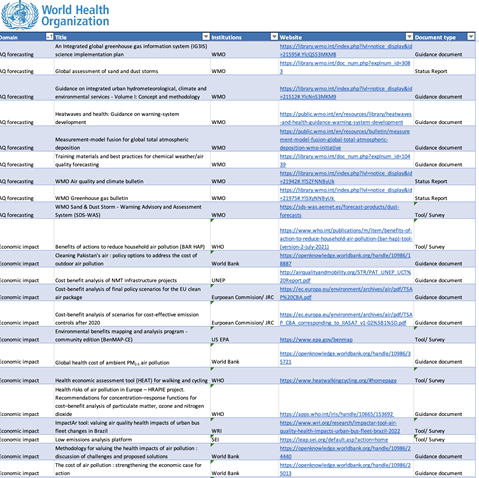Repository of guidance documents and tools for air quality management systems

Overview
Exposure to air pollution is the second leading cause of deaths from noncommunicable diseases (NCDs), after tobacco-smoking. For 2019, WHO estimated that 6.7 million premature deaths every year could be attributed to ambient and household air pollution from particulate matter (particles with a diameter less than 2.5 microns, PM2.5), with 4.2 million deaths being attributed to ambient air pollution.
With the release of the 2021 WHO Air Quality Guidelines which were more stringent, and the increasing demand from Member States to support and build capacity for their air quality management capabilities, WHO convened UN agencies involved in air quality activities in a working group to discuss the reporting criteria for Sustainable Development Goals (SDG) indicator 11.6.2 – air quality in cities – and to leverage action.
The report entitled, Improving the capacity of countries to report on air quality in cities: Users’ guide to the repository of United Nations tools, summarizes the discussions and the way forward, encompassing existing frameworks and programmes related to air pollution, such as the United Nations Economic Commission for Europe (UNECE) Convention on Long-Range Transboundary Air Pollution, the World Meteorological Organization (WMO) Global Atmosphere Watch Programme, the United Nations Environment Programme (UNEP) resolutions on air pollution and the World Bank Pollution Management and Environmental Health Programme.
From the discussions of this working group there are two main outputs. Firstly, this repository that aims to be a one-stop-shop combining existing documents predominantly from UN tools and guidance documents to support the SDG 11.6.2 reporting. Another output from this work is general air quality management tools that enable assessment of countries’ baseline air quality management capabilities as well as identification of specific areas of air quality management systems in which progress is being made, and other areas requiring more focus and resources (see the report for general tools such as Air Quality Management screening tool and survey).
